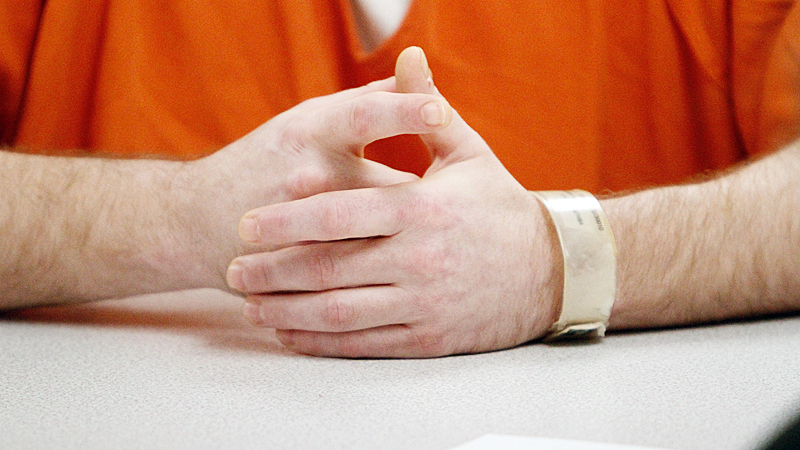Incarceration and mental illness

By JORDYN GRZELEWSKI
jgrzelewski@vindy.com
YOUNGSTOWN
For most of his life, Harry Wynn Jr. didn’t know why he felt the way he did.
“I self-medicated for years, not knowing I was suffering from any kind of depression,” said Wynn, 33, of Hubbard. “My anxiety was just crazy.”
For 20 years, he abused substances to keep his anxiety and depression at bay. At times he got better, but life stresses sometimes pushed him to relapse.
Wynn shared this recently from the Mahoning County jail, where he was serving a sentence related to drug possession charges. On that day, he met with a counselor helping him prepare for his release.
Pre-release counseling is among numerous support services the jail offers to inmates dealing with mental illness and/or substance-use disorders.
Aided by a national initiative aimed at reducing the number of people with mental illnesses in jails, the Mahoning County Sheriff’s Office, Mahoning County Mental Health and Recovery Board and local providers have partnered to provide additional services to inmates with mental illnesses. In addition to treatment and counseling in the jail, the program helps inmates prepare for their release, with the goal that they won’t end back up in jail.
“The goal is to break the cycle of people who go to jail instead of going into mental health treatment, and prevent them from cycling in and out, in and out of the system,” said Evelyn Lundberg Stratton, Ohio project director for Stepping Up, the national initiative on mental illness in jails.
“Recovery works, but you can’t just place somebody in jail and not provide them with any treatment and expect them to get better,” said Duane Piccirilli, executive director of the Mahoning County Mental Health and Recovery Board. “If you lock somebody up and you don’t give them any treatment, they’re going to get locked up again.”
THE NEED
Nationally, jails house an estimated 2 million people with mental illnesses each year, about 75 percent of whom also have substance-use disorders, according to information provided by Stepping Up, which cites a 2009 study.
The same study indicates that, among jail populations, the prevalence of mental illness is three to six times higher than in the general population.
A 2011 Duke University of Medicine report cited by Stepping Up suggests jails spend two to three times more money on adults requiring mental-health interventions than on other inmates.
In Ohio, an estimated 30 percent of inmates have a mental illness.
Locally, the story is similar. Jail officials say 33 percent of inmates are on medications for psychiatric conditions.
“We are definitely one of the biggest mental health hospitals in Mahoning County,” Sheriff Jerry Greene said.
As a trial judge, Stratton witnessed firsthand the cycle of incarceration of the mentally ill.
She recalled one man who went through the Franklin County court system nearly 200 times, costing taxpayers millions of dollars. It turned out he was a veteran with untreated post-traumatic stress disorder, she said.
Her experience with these cases prompted her to get involved in seeking solutions. She eventually left the Ohio Supreme Court bench to dedicate more time to work on the issue. She joined Stepping Up, an initiative of the National Association of Counties, Council of State Governments Justice Center and American Psychiatric Foundation that is supported by the U.S. Justice Department’s Bureau of Justice Assistance that began in 2015.
In Ohio, the initiative is funded by the Margaret Clark Morgan Foundation.
County governments that join Stepping Up then commit to writing action plans. Stepping Up provides various supports along the way.
“It kind of pulls everything together,” Piccirilli said. “We really see an impact with addressing the issue of mentally ill people in the jail.”
Since Mahoning County signed on in September 2015, the mental health and recovery board and sheriff’s office went after a state grant and increased services in the jail “immensely,” Piccirilli said.
The county received $212,000 from the state in fiscal years 2016 and 2017, and $110,000 in fiscal year 2018, according to the mental health and recovery board.
That money has helped the county provide services such as mental-health and substance-use disorder screenings and assessments; treatment in the jail and at Community Corrections Association; individual and group counseling; psychiatric services; pre-release planning; peer support upon release; and coordinated treatment and support services upon release.
These services are provided by organizations such as Meridian Healthcare, COMPASS Family and Community Services, Catholic Charities Regional Agency, and Flying HIGH Inc., among others.
The program helps people being released find housing, obtain benefits, reunite with family, continue their treatment and more.
“Before this program started, we would find that a lot of times people would get out of the jail without the support and they would either break the law again or be victimized,” Piccirilli said.
During his time in jail, Wynn took advantage of several of those services. As he prepared to leave, he said he felt capable of getting back to his life, which includes caring for four children.
With the help of services offered at the jail, Wynn said he learned to “quit trying to do everything my own way.”
Overall, he said he felt he received the guidance he needed, and now knows he needs to address his mental health.
“They’re definitely helping us every way they can,” Wynn said.
 43
43
